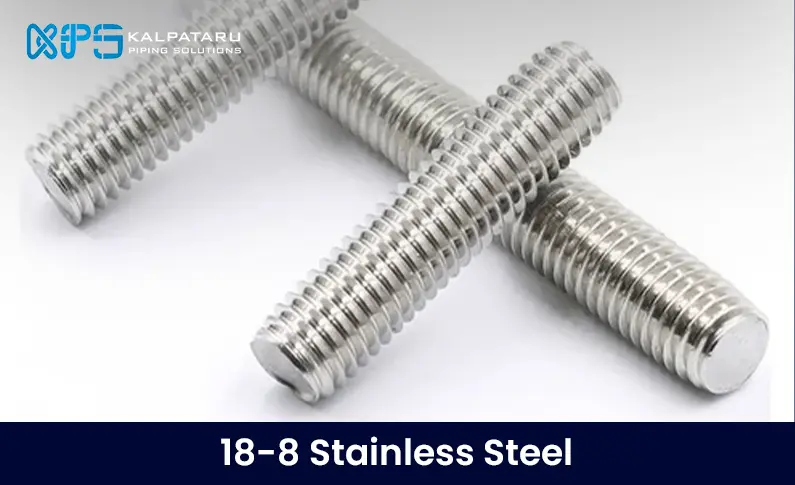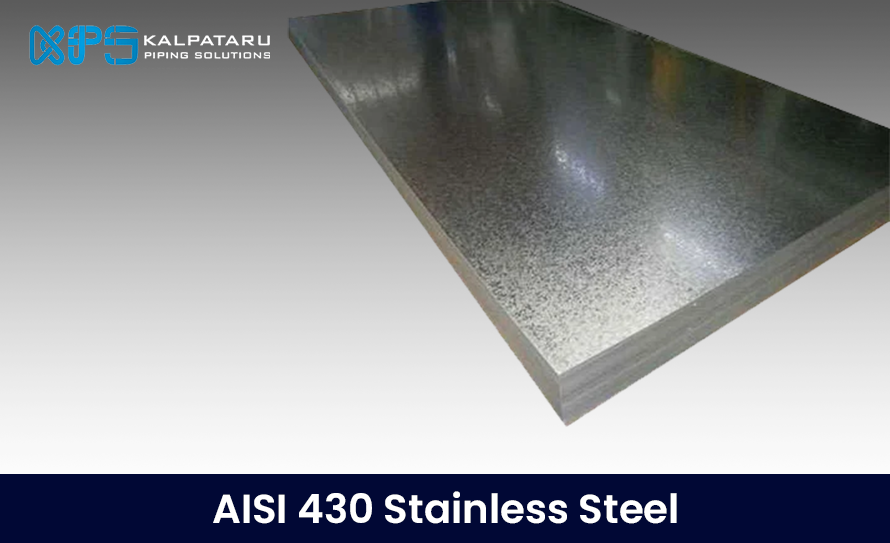18-8 Stainless Steel Chemical Compositions
| Chemical Composition, % | |||||||||||
| ASTM | AISI (UNS) | C, ≤ | Si, ≤ | Mn, ≤ | P, ≤ | S, ≤ | Cr | Ni | N, ≤ | Product | |
| ASTM A240/A240M | 304 (UNS S30400) | 0.07 | 0.75 | 2.00 | 0.045 | 0.030 | 17.5-19.5 | 8.0-10.5 | 0.10 | Plate, Sheet, and Strip | |
| ASTM A276A/276M | 0.08 | 1.00 | 2.00 | 0.045 | 0.030 | 18.0-20.0 | 8.0-11.0 | – | Bars and Shapes | ||
18-8 stainless steel Mechanical Properties
| Property | Value |
|---|---|
|
Density
|
8.0 g/cm³
|
|
Melting Point
|
1,400–1,450 °C
|
|
Thermal Conductivity
|
16.2 W/m·K at 100 °C
|
|
Electrical Resistivity
|
720 nΩ·m at 20 °C
|
|
Modulus of Elasticity
|
193 GPa
|
|
Poisson’s Ratio
|
0.29
|
|
Tensile Strength
|
515 MPa
|
|
Yield Strength
|
205 MPa
|
|
Hardness (Rockwell B)
|
70–85 HRB
|
|
Hardness (Brinell)
|
201–262 HB
|
|
Corrosion Resistance
|
Excellent
|
|
Magnetic Properties
|
Non-magnetic
|
How 18/8 Stainless Steel is Made
18/8 stainless steel is produced in a process similar to other stainless steels, starting with melting its main components—chromium, nickel, iron, and other alloys—in an electric arc furnace. As the metals liquefy, they go through a refining process to remove impurities, which are separated as slag. Once purified, the molten steel is poured into molds, forming ingots, billets, or slabs. After cooling and solidifying, the steel undergoes further processing and finishing, ready to be used in a wide range of applications, from aerospace and automotive parts to household items.
18-8 Stainless Steel Material Properties or Physical Properties
- Density: 7.9 g/cm³ (Equivalent to 7900 kg/m³ or 7.9 x 10³ kg/dm³)
- Melting Point: Approximately 1400-1450°C (2552-2642°F)
- Magnetic Properties: Generally non-magnetic, distinguishing it from the magnetic 400 series stainless steels.
- Specific Heat Capacity: 500 J/(kg·K) or 0.12 BTU/(lb·°F)
- Electrical Resistivity: 720 Ω·mm²/m (Equivalent to 720 μΩ·m)
- Modulus of Elasticity (Elastic Modulus): Around 193 GPa (Equivalent to 193 kN/mm² or 193 × 10³ MPa)
- Thermal Diffusivity: Approximately 3.8 x 10⁻⁶ m²/s
- Thermal Conductivity: Typically 16-24 W/(m·K)
- Coefficient of Thermal Expansion: 16-17 x 10⁻⁶/K or 16-17 μm/(m·K)
Type 304 Physical Properties
| Type 304 Physical Properties | |
| Density, g/cm3 (lb/in3) | 7.93 (0.286) |
| Melting point, °C (°F) | 1400-1450 (2550-2650) |
| Specific heat capacity, J/kg·K (Btu/lb ·°F) | 500 (0.12) at 20 °C (68 °F) |
| Electrical resistivity, μΩ·m | 0.72 at 20 °C (68 °F) |
| Conductivity, %, IACS | 2.5 |
| Magnetic permeability | 1.02 (Approximate) |
| Elastic modulus (Modulus of Elasticity), GPa (106 psi) | 193 (28) |
| Thermal diffusivity, mm2/s (in2/s) | 3.84 (0.006) |
| Thermal conductivity, W/m·K (Btu/ft·h·°F) | 16.2 (9.4) at 100 °C (212 °F) |
| 21.5 (12.4) at 500 °C (932 °F) | |
| Coefficient of thermal expansion (CTE), 10-6/K (μin./in·°F) | 17.2 (9.6) at 0-100 °C (32-212 °F) |
| 17.8 (9.9) at 0-315 °C (32-600 °F) | |
| 18.4 (10.2) at 0-538 °C (32-1000 °F) | |
Uses and Applications of 18/8 Stainless Steel
18/8 stainless steel is incredibly versatile and widely used across various industries due to its durability and corrosion resistance. It is commonly found in:
Cookware: Pots, pans, and cooking utensils.
Kitchen Appliances: Items like dishwashers and refrigerators.
Architectural Elements: Window frames, handrails, and decorative pieces.
Automotive Parts: Grilles, exhaust pipes, trim, and body panels.
Medical and Dental Equipment: It’s hygienic, easy to sterilize, and biocompatible.
Construction Materials: Used in roofing, cladding, and handrails.
Food and Chemical Processing: Ideal for tanks, cans, and piping systems.
This stainless steel is favored for its strength, ease of cleaning, and ability to resist rust and staining, making it a top choice for many applications.
Advantages and Disadvantages of 18/8 Stainless Steel
When considering 18/8 stainless steel, it’s important to weigh its advantages and disadvantages:
Advantages
- Exceptional Corrosion Resistance: It only loses to 18/10 in this area, making it highly resistant to rust and staining.
- Strength and Durability: It can withstand heavy loads and mechanical stress without failing.
- Hygienic and Easy to Clean: Its smooth surface makes it ideal for food preparation and medical applications, where cleanliness is crucial.
- Aesthetic Appeal: The bright, silvery finish gives it a polished look that enhances the visual appeal of products.
- Versatile Fabrication: It is reliable for welding, machining, and forming into complex shapes.
- Recyclable: Being environmentally friendly, it can be recycled, helping to reduce waste.
Disadvantages
- Higher Cost: The increased nickel content makes it more expensive than some other stainless steels.
- Magnetic Properties: Although it’s mainly non-magnetic, it can develop a slight magnetic pull after cold working.
- Vulnerability to Corrosive Environments: Saltwater, chlorinated water, and other highly corrosive substances can degrade it more quickly than in other environments.
- Heat Sensitivity: While it has a high melting point, prolonged exposure to very high temperatures can compromise its structural integrity.
Overall, 18/8 stainless steel is a reliable and popular choice for a wide range of applications, but it’s essential to consider these factors when selecting the right material for your needs.
Conclusion
18/8 stainless steel is an essential material used in many industries, forming the backbone of numerous products. Its blend of strength, resistance to corrosion, and attractive finish makes it a top choice for various applications. Whether in cookware, automotive parts, or medical equipment, 18/8 stainless steel consistently delivers reliability and performance, making it a favored option across the board.
FAQs
Is 18-8 a good grade of stainless steel?
Yes, 18-8 stainless steel is a good grade. It offers decent corrosion and oxidation resistance and is non-reactive, making it safe for food use in kitchens and restaurants.




